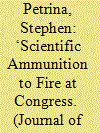| Srl | Item |
| 1 |
ID:
167447


|
|
|
|
|
| Summary/Abstract |
This article explains how exploitation of research and development (R&D) configured into the post–World War II policies of the U.S. Army Air Forces (AAF) and U.S. Air Force (USAF). The narrative follows the coordination of operations LUSTY, OVERCAST, and PAPERCLIP and the Scientific Advisory Group (SAG) in the AAF’s exploitation of intelligence and reparations for postwar policies and politics. The history of the SAG’s efforts from 1944 to 1947 reveals the intensity with which the AAF and its consultants in the aeronautical sciences pursued Nazi R&D. The article helps explain the place of intelligence and reparations in AAF and USAF policies for postwar R&D.
|
|
|
|
|
|
|
|
|
|
|
|
|
|
|
|
| 2 |
ID:
164793


|
|
|
|
|
| Summary/Abstract |
The 1 August 1943 low-level, U.S. Army Air Forces heavy bomber attack on the Ploesti oil facilities in Romania is best known for its daring, its crews’ bravery, and the heavy losses. Little attention has been given to an examination of the plan for the attack, the reasons for its failure, or its limited results. One of the most significant factors contributing to the outcome was combat friction, the accumulation of a number of unforeseen, relatively minor factors that disrupted the plan. This mission illustrates that daring and bravery, while necessary and important, are insufficient for military success and that flexibility and leadership are essential to overcome friction.
|
|
|
|
|
|
|
|
|
|
|
|
|
|
|
|